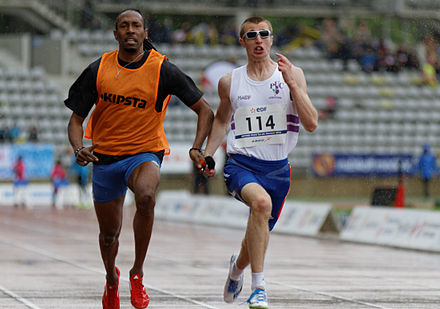Sports
Paralympic Games

At the Paralympic Games there are various classifications of athletes with a visual impairment.

The Paralympics is a major international multi-sport event involving athletes with a range of disabilities, including impaired muscle power, impaired passive range of movement, limb deficiency, leg length difference, short stature, hypertonia, ataxia, athetosis, vision impairment and intellectual impairment. There are Winter and Summer Paralympic Games, which since the 1988 Summer Games in Seoul, South Korea, are held almost immediately following the respective Olympic Games. All Paralympic Games are governed by the International Paralympic Committee (IPC).
Rules are according to the International Blind Sports Association (IBSA) and the International Paralympic Committee (IPC).

The International Paralympic Committee is an international non-profit organisation and the global governing body for the Paralympic Movement. The IPC organizes the Paralympic Games and functions as the international federation for nine sports. Founded on 22 September 1989 in Düsseldorf, Germany, its mission is "To enable Paralympic athletes to achieve sporting excellence and inspire and excite the world". Furthermore, the IPC wants to promote the Paralympic values and to create sport opportunities for all persons with a disability, from beginner to elite level.
The sighted guides are such a close and essential part of the competition, that the athlete with a visual impairment and the guide are considered a team, and both athletes are medal candidates. [1]
Winter
At the Winter Paralympics there are three classifications of athletes with a visual impairment:

B1 is a medical-based Paralympic classification for blind sport. Athletes in this classification are totally or almost totally blind. It is used by a number of blind sports including para-alpine skiing, para-Nordic skiing, blind cricket, blind golf, five-a-side football, goalball and judo. Some other sports, including adaptive rowing, athletics and swimming, have equivalents to this class.

B2 is a medical based Paralympic classification for blind sport. Competitors in this classification have vision that falls between the B1 and B3 classes. The International Blind Sports Federation (IBSA) defines this classification as "visual acuity ranging from LogMAR 1.50 to 2.60 (inclusive) and/or visual field constricted to a diameter of less than 10 degrees." It is used by a number of blind sports including para-alpine skiing, para-Nordic skiing, blind cricket, blind golf, five-a-side football, goalball and judo. Some sports, including adaptive rowing, athletics and swimming, have equivalents to this class.

B3 is a medical based Paralympic classification for blind sport. Competitors in this classification have partial sight, with visual acuity from 2/60 to 6/60. It is used by a number of blind sports including para-alpine skiing, para-Nordic skiing, blind cricket, blind golf, five-a-side football, goalball and judo. Some other sports, including adaptive rowing, athletics and swimming, have equivalents to this class.
A sighted guide is required for B1 and B2, and optional for B3.
Nordic skiing:
The guide can lead, follow, or ski next to the athlete with a visual impairment. The guide assists with voice instruction only. No physical contact allowed.
Alpine skiing:
The start must have an adequate space for the guide. [3] [4]
- Combined
- Downhill
- Giant slalom
- Slalom
- Super-G
Summer

Athletics:
In athletics the sighted guides can win a medal. [5]
Cycling: Pilot
Equestrian:
Football 5-a-side:
Triathlon:





